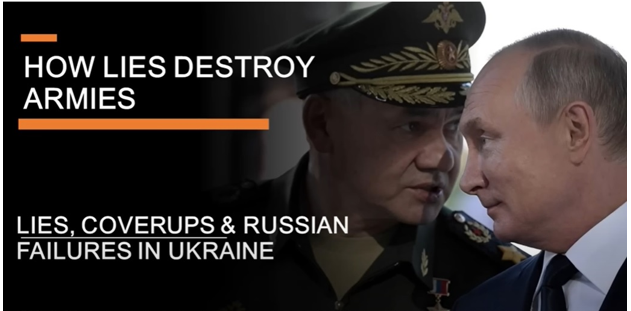 Editor’s note: Vranyo is a noun formed from the verb ‘vrat,’ which means “to lie,” but has a more colloquial, pejorative flavor. Vranyo has been described as a lie that no one would take seriously, or as explained in a recent Reddit thread, “You know I’m lying, and I know that you know, and you know that I know that you know, but I go ahead with a straight face and you nod and take notes.”
Editor’s note: Vranyo is a noun formed from the verb ‘vrat,’ which means “to lie,” but has a more colloquial, pejorative flavor. Vranyo has been described as a lie that no one would take seriously, or as explained in a recent Reddit thread, “You know I’m lying, and I know that you know, and you know that I know that you know, but I go ahead with a straight face and you nod and take notes.”
Australian military analyst Perun runs an insightful YouTube channel on military affairs that has focused in recent months on the Russian invasion of Ukraine. With a delightfully dry sense of humor, he describes the use of HIMARS missile systems as “converting American military surplus to foreign architectural re-modeling” and frequent refers to the fighting spirit, or lack thereof, of the Russian “Private Conscriptovich.”
A recent video titled “How Lies Destroy Armies” starts by explaining multiple Russian words meaning variations on “lying” with “vranyo” being a sort of lying broadly recognized as untrue but with little to no objection offered.
“Vranyo” is a term difficult to define in English, but Wikitionary defines the term as “White lies or half-lies in Russian culture, told without the intention of (maliciously) deceiving, but as a fantasy, suppressing unpleasant parts of the truth.”
Perun describes how people up and down the Russian military found it to be in their personal interest to exaggerate the readiness of troops and their equipment. Russian officers found it in their best interest to exaggerate capabilities in order to get promoted and to turn a blind eye to endemic issues of corruption.
After all, it is easier to create a highly trained and well-equipped unit on paper than in reality, and Russian officers don’t generally get promoted for reporting on the antiquated equipment and alcoholism of the troops they were responsible for training.
Military intelligence likewise found it to be in their interest to report what their superiors wanted to hear regarding the readiness of the Ukraine and the likely response of other nations to invasion. Vranyo reckoned Russia to be strong, Ukraine to be a pushover and the countries likely to oppose the invasion to be irresolute and feckless. All of this proved to be wildly mistaken, pushing Russia quickly out of the vranyo-laced clouds of a three-day “special operation” fantasy into the stark reality of an ongoing military and economic fiasco.
American K-12 has numerous examples of vranyo-style institutionalized wishful thinking. “Separate but equal” for example had plenty of “separate” but very little “equal.” The “individual education plans” developed for students with disabilities are often elaborate plans at legal liability avoidance rather than individualized plans to educate students. You’ve probably already thought of multiple other examples.
Americans desperately want to believe that public education promotes equality of opportunity, so much so that they are blind to the many ways in which it institutionalizes inequality. Public school advocates will hold forth on how “school districts take everyone” but ignore glaring examples of when they openly discriminate.
“Two weeks to flatten the curve” morphed into “two years to flatten the prospects of a generation of students” in many states as the interests of adults trumped those of students yet again during COVID-19.
Perun could have just as easily been describing American K-12 as the Russian military in noting:
The issue though, in the case of the Russian case but many others besides, is that this element of culture, like corruption, can be very, very deeply entrenched to the point where the system of position and reputation is built around it. And so, trying to pick it apart is a threat to all the actors involved…Vranyo enables them to advance their careers, protect reputations and hold the whole system together.
The main legacy of the COVID-19 pandemic lies in revealing American K-12 vranyo to millions of parents and future parents. The interests of adult employees will always come before those of students or taxpayers.
Just as the Russian army is happy to conscript people and throw them into battle with little training and inadequate equipment, the public-school system is happy to conscript students into system without teaching them basic literacy.
It will continue to do so as long as it funds adult salaries and pensions. If you want to escape Russian military vranyo, you need to flee the country. To escape American K-12 vranyo, you need to make education plans outside the system.


